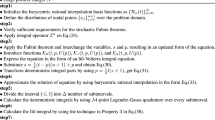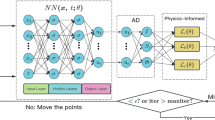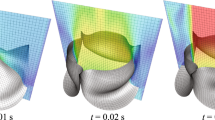Abstract
Our goal is to develop adaptive strategies in order to obtain finite element solutions of the partial differential equation-Δu=f(u) in a bounded domain Ω ⊆ ℝ2. In practice one works with an approximationf h off. But this may give wrong results if we do not control the coresponding approximation error on coarse girds. In this work we develop a strategy that is robust, but less efficient, in the beginning of the adaptive algorithm and switches to a more efficient procedure if certainsaturation conditions are satisfied. The results are based on a posteriori saturation criterial that measure the quality of the approximation solution.
Zusammenfassung
Wir entwickeln adaptive Methoden zur Berechnung von Finite Elemente-Lösungen der Partiellen Differentialgleichung −Δu=f(u) auf einem beschränktem Gebiet Ω ⊆ ℝ2. In der Praxis arbeitet man mit einer Approximationf h vonf, was zu falschen Ergebnissen führen kann, wenn man den zugehörigen Approximationsfehler auf dem groben Gitter nicht mitberücksichtigt. Wir verwenden eine Strategie, die zu Beginn der Iteration robust aber weniger effizient ist und gehen zu effektiveren Methoden über, falls gewisse Sättigungsbedingungen erfühlt sind. Dazu leiten wir a posteriori Fehlerschranken und a posteriori Sättigungsbedingungen her, um die Qualität der numerischen Lösung zu beurteilen.
Similar content being viewed by others
References
Adams, R. A.: Sobolev spaces. New York: Academic Press, 1975.
Bank, R.: A posteriori error estimates bases on hierarchical basis. SIAM J. Numer. Anal.30, 921–935 (1993).
Bänsch, E.: Local mesh refinement in 2 and 3 dimensions. Impact Comput. Sci. Eng.3, 181–191 (1991).
Ciarlet, P. G.: The finite element method for elliptic problems. Amsterdam. North-Holland, 1979.
Clément, P.: Approximation by finite element functions using local regularizations. RAIRO Anal. Numér.2, 77–84 (1975).
Dörfler W.: A convergent adaptive algorithms for Poisson's equation. To appear in SIAM 3. Numer. Anal. (1996).
Grossmann, C., Roos, H. G.: Feedback-grid generation via monotone discretization for two-point boundary-value problems. IMA J. Numer. Ana.6, 421–432 (1986).
Gilbarg, D., Trudinger, N.: Elliptic partial differential equation of second order. Berlin, Heidelberg, New York: Springer, 1977.
Ishihara, K.: Monotone explicit iterations of the finite element approximation for the nonlinear boundary value problem. Numer. Math.43, 419–437 (1984).
Johnson, C.: Adaptive finite-element methods for diffusion and convection problems. Comput. Meth. Appl. Mech. Eng.82, 301–322 (1990).
Kardestuncer, H., Norre, D. H. (eds.); Finite element handbook. New York: McGraw-Hill, 1987.
Kufner, A., Sändig, A. M.: Some applications of weighted Sobolev spaces., Leipzig: Teubner, 1987.
Spanier, J., Maize, E. H.: Quasi-random methods for estimating integrals using relatively small samples. SIAM Rev.36, 18–44 (1944).
Verfürfth, R.: A posteriori error estimates for nonlinear problems. Finite element discretizations of elliptic equations. Math. Comp.62, 445–475 (1994).
Author information
Authors and Affiliations
Rights and permissions
About this article
Cite this article
Dörfler, W. A robust adaptive strategy for the nonlinear Poisson equation. Computing 55, 289–304 (1995). https://doi.org/10.1007/BF02238484
Received:
Revised:
Issue Date:
DOI: https://doi.org/10.1007/BF02238484




